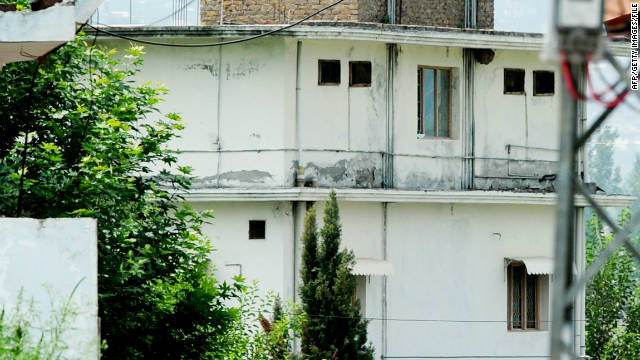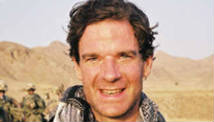Bin Laden’s final days — big plans, deep fears
Bin Laden's final days -- big plans, deep fears
updated 6:16 PM EDT, Fri March 16, 2012

The compound where Osama bin Laden lived in his final years -- and died.
STORY HIGHLIGHTS
- Peter Bergen: Osama bin Laden's final writings show al Qaeda felt under siege
- He says the al Qaeda leader was still determined to strike at the U.S.
- Bergen says bin Laden urged assassination attempts against U.S. officials
- He says bin Laden's writings showed his final days were filled with paranoia
Editor's note: Peter Bergen, CNN's national security analyst, is a director at the New America Foundation. His book "Manhunt: The Ten-Year Search for Bin Laden; From 9/11 to Abbottabad" will be published on May 1.
Washington (CNN) -- Tapping away at his computer in the study of the suburban compound in Abbottabad, Pakistan, that he called home for the last years of his life, Osama bin Laden wrote memos urging his followers to continue to try to attack the United States, suggesting, for instance, they mount assassination attempts against President Obama and Gen. David Petraeus.
While he urged his organization on to attack America, bin Laden was also keenly aware that al Qaeda was in deep trouble because of the campaign of CIA drone strikes in Pakistan and also because the brutal tactics of his followers had alienated many Muslims.
According to senior Obama administration officials who have reviewed the "treasure trove" of the thousands of documents that were picked up by the U.S. Navy SEALs from bin Laden's compound in Abbottabad, the leaders of al Qaeda understood that the group they led was "beleaguered." CNN was given a briefing this week by senior administration officials who have been analyzing the documents.

Peter Bergen
Bin Laden wrote a 48-page memo to a deputy in October 2010 that surveyed the state of his organization. He was particularly concerned that al Qaeda's longtime sanctuary in Waziristan in Pakistan's tribal areas was now too dangerous because of the campaign of American drone strikes there that had picked off many of his key lieutenants.
According to a count by the New America Foundation, the CIA launched a record number of 118 strikes into the tribal regions during 2010, the year bin Laden wrote this memo.
Bin Laden advised his followers not to move around the tribal regions except on overcast days when America's all-seeing satellites and drones would not have as good coverage of the area.
He also urged his followers to depart the tribal regions for the remote Afghan provinces of Ghazni, Zabul and, in particular, Kunar, pointing out that the high mountains and dense forests of Kunar provided especially good protection from prying American eyes.
Bin Laden fretted about his 20-year-old son, Hamza, who had recently been released from house arrest in Iran, instructing his deputy to tell his son to move out of Waziristan. He also provided elaborate instructions about how Hamza might evade the surveillance of the American drones in the tribal regions by meeting members of al Qaeda inside a particular tunnel on the road between the western Pakistani town of Kohat and the city of Peshawar.
During his final days, bin Laden's world was filled with paranoia. He instructed that Hamza should throw out anything he had taken with him from Iran as it might contain some kind of tracking device, and that he should avoid the company of a man who might have ties to the Pakistani intelligence services.
Bin Laden also reminded his deputies that all internal communications should be made by letter rather than by phone or the Internet.
As a result, according to administration officials, bin Laden had to wait for responses to his queries to his deputies that could sometimes take up to two or three months to be delivered -- surely not an efficient way to run any organization.
Bin Laden also advised his lieutenants that when they kidnapped someone they should take many precautions during the negotiating process and also throw away any bags that contained ransom money because they might also contain a tracking device.
The spectacular set of self-inflicted mistakes made by al Qaeda's affiliate in Iraq weighed heavily on the minds of bin Laden and his top advisers. Privately, they criticized the brutal tactics of al Qaeda in Iraq, which had provoked a tribal uprising against al Qaeda that had dealt a large blow to the group's position in Iraq from 2006 onward.
Until the end, bin Laden remained fixated on attacking the United States, prodding his deputy to "nominate one of the qualified brothers to be responsible for a large operation in the U.S."
According to administration officials, bin Laden's number two, Ayman al-Zawahiri, pushed back, telling bin Laden it was much more realistic to attack American soldiers in Afghanistan than American civilians in the United States.
Bin Laden did urge his followers to scope out opportunities to attack President Obama or Petraeus while they were in Afghanistan. At the time, Petraeus was the commanding general of NATO soldiers in Afghanistan.
Bin Laden noted snidely that killing Obama would pave the way for Vice President Joe Biden to assume the presidency. The al Qaeda leader said Biden was "totally unprepared" for the job.
Above all, bin Laden constantly fretted about his media image, pointing out to his deputies that "a huge part of the battle is in the media."
For the 10th anniversary of the 9/11 attacks, bin Laden wanted his media team to emphasize particularly that the wars in Afghanistan and Iraq were one of the main reasons for the financial crisis in the United States. (Bin Laden bought his compound in Abbottabad with cash, so presumably he didn't quite understand the dimensions of the subprime mortgage debacle.)
One of his media advisers, who U.S. officials believe to be the American al Qaeda recruit Adam Gadahn, suggested bin Laden take advantage of the 9/11 anniversary in 2011 to record a 'high definition' videotape message that could be given to all the major American news networks, except to Fox News, which Gadahn said "lacks neutrality." It doesn't appear that bin Laden made such a tape.
Administration officials say it is strange that in all the documents recovered at the bin Laden compound there is no mention at all of al Qaeda's plot to use liquid explosives to bring down as many as seven American, British and Canadian passenger planes flying from Heathrow Airport in 2006. If this plot had succeeded it might have rivaled 9/11 as a spectacular attack.
Bin Laden moved into his Abbottabad compound either at the end of 2005 or sometime in 2006 and an administration official says that, perhaps, information about the Heathrow plot "got lost in the move."
Follow us on Twitter: @CNNOpinion

FEATURED BOOK

